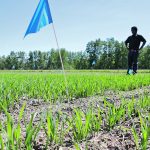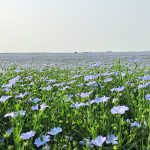SaskCanola and SaskFlax make their final presentations as SaskOilseeds gets to work representing producers’ interests
REGINA — SaskOilseeds took the stage as the newest provincial crop commission earlier this month, with the final presentations from SaskCanola and SaskFlax and the reveal of a new logo. The merger of the two was official Aug. 1, and after wrapping up some final financial transactions, the new entity has settled in to handle […] Read moreTag Archives SaskCanola

Verticillium stripe in spotlight as threat grows
A U of A study just wrapped up, and four Canola Agronomic Research Program projects are now investigating the disease
Glacier FarmMedia – If you’re a canola grower on the Prairies, you know there are no chemical solutions or varieties to kill or resist soil-borne verticillium stripe disease. You may also know the handful of management practices that can thwart the disease to some extent. And if a crop has been damaged by it, you […] Read more
Clubroot removed from official declared pest list in Sask.
Richardson’s ground squirrel, grasshoppers and the warble fly are also no longer on the province’s list of declared pests
REGINA — Clubroot is among several pests the Saskatchewan government has now deregulated. The government in June repealed the Pest Control Act and replaced it with the Plant Health Act and its accompanying regulations. As a result, clubroot, Richardson’s ground squirrel, grasshoppers and the warble fly are no longer on the list of declared pests. […] Read more
New website against weeds launched
Farmers will be able to access a library of resources, events, weed distribution maps and other tools to inform their fights against weeds

Black Sea region expected to produce more flax
The crop is faring better than others in Russia's drought-hit regions, and acreage is anticipated to be higher than last year

Farm groups wrestle with feds over ag research
Ottawa’s focus on climate change mitigation puts it at odds with farmers who want to focus on ways to improve production
WINNIPEG — At nearly every farm and commodity group meeting this winter across Canada, a farmer in the crowd will make the same statement or ask a similar question. They will express frustrations with the federal government and its insistence that all research must consider greenhouse gas emissions from agriculture. At the Manitoba Pulse & […] Read more
Cold tolerance of canola seeds under the microscope
Researchers have discovered certain canola varieties have more tolerance for cold soils, but they don’t know why
In most of Europe, farmers plant rapeseed in the fall because it usually out-yields rapeseed that’s planted in the spring. That isn’t an option for western Canadian farmers. Winter canola cannot withstand the frigid winters and chilly springs on the Prairies. Still, it would be helpful if spring-seeded canola grew more rapidly, to take advantage […] Read more
Research priorities worry farmers

New crop meeting format criticized





